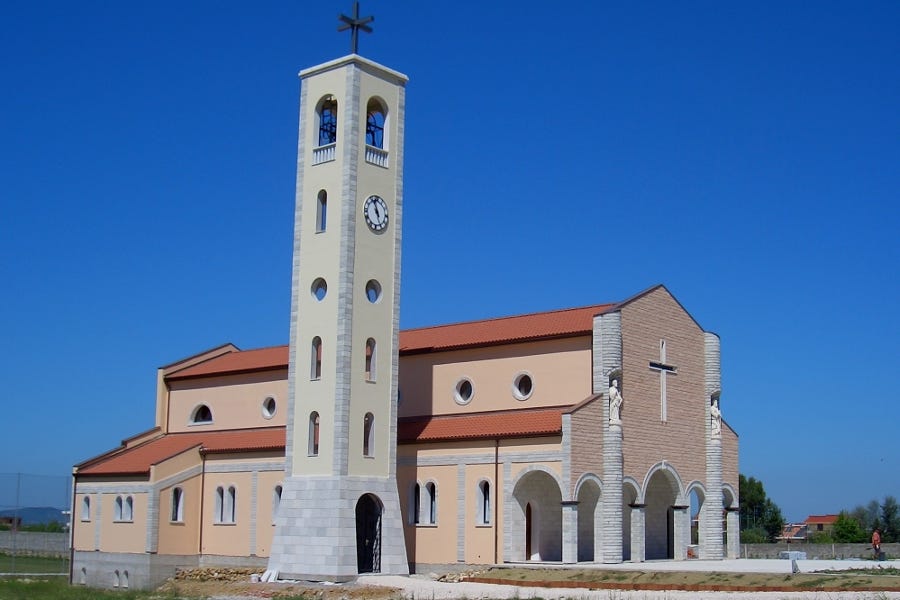The Apostolic Administration of Southern Albania was founded in 1939. Eighty-four years later, it has witnessed its first priestly ordination.
Fr. Paolo Marasco was ordained April 25 at the Church of Sts. Peter and Paul in Lushnjë, west-central Albania.
Marasco, 40, is a member of the Piccola Famiglia dell’Assunta, a monastic community in the Italian province of Rimini that has ties to Albania.
For years, the Diocese of Rimini has supplied the Apostolic Administration of Southern Albania with fidei donum missionaries, named after a 1957 encyclical by Pope Pius XII urging dioceses to send clergy to serve in mission territories. But unlike Marasco, the fidei donum priests were ordained in Italy, rather than Albania.
Marasco was ordained by Bishop Giovanni Peragine, who has led the apostolic administration since 2017. Rimini’s Bishop Nicolò Anselmi provided dimissorial letters testifying to Marasco’s worthiness for ordination.
Albania is a country of around 2.8 million people located in the Balkans, across the Adriatic Sea from Italy.
The Apostolic Administration of Southern Albania, erected on Nov. 11, 1939, covers 6,246 square miles, but serves only around 3,000 Catholics, or 0.2% of the population.
Apostolic administrations are often created in mission territories where the Church is yet to establish dioceses, similar to apostolic vicariates and other canonical entities. The administration has its own ordinary, who enjoys broadly the same governing powers as a diocesan bishop, but may or may not be a bishop.
Historically, the Catholic population of Albania has been concentrated in the north of the country. Albania’s five dioceses — Tiranë-Durrës, Shkodrë-Pult, Lezhë, Rrëshen, and Sapë — are all located in the north, while the Apostolic Administration of Southern Albania covers the nation’s southern half, home to many Orthodox Christians and Muslims.

Orthodox clergy were present at Marasco’s ordination. The new priest will reportedly meet with Muslim community representatives in the coming days.
The Apostolic Administration of Southern Albania has been a suffragan of the Archdiocese of Tiranë-Durrës since 2005. It is dependent on the Vatican’s Dicastery for Bishops, rather than the Dicastery for Evangelization, as is the case with many missionary territories.
The apostolic administration has jurisdiction over members of the Albanian Greek Catholic Church, one of the 23 Eastern Catholic Churches in full communion with Rome, as well as Latin Catholics living in its territory.
Fr. Marasco joined the Piccola Famiglia dell’Assunta in 2005 and professed his perpetual vows in 2012.
In an interview with Il Piccolo, the newspaper of Italy’s Faenza-Modigliana diocese, he said: “In precisely the year of my entry, my community began a presence in southern Albania, in a territory with an Islamic majority and a traditional Orthodox presence.”
“Right from the start, I spent some periods in the mission, seven years in total. It is a presence of service to the least, the disabled, and the poorest, which gives us the opportunity to announce the Gospel.”
Marasco has lived in the Italian city of Ravenna in recent years, but returned to Albania a few months ago, living in the historic southern city of Berat. His mother reportedly died of illness days before his ordination.
In the 20th century, the Catholic Church in Albania suffered intense persecution under the communist regime led by Enver Hoxha. In 1967, Hoxha, proclaimed that Albania was the “first atheist state of the world.”
Since the regime’s collapse in the early 1990s, the Church has experienced a renaissance, accounting today for almost 18% of the population.
Albania was the destination for Pope Francis’ first trip to a European country outside of Italy, in 2014.
The pope was moved to tears as he heard the testimony of Fr. Ernest Simoni, who endured torture and years of forced labor under the communist authorities. He named Simoni a cardinal in 2016.
Marasco told Il Piccolo: “At Berat, where I am a pastor, the Church is being built person by person, on the martyrdom experienced up to 30 years ago in the most atheistic regime in the world.”
“The mission is a proposal and an extraordinary opportunity to see the Gospel come alive. And I hope it is a call for someone to come and see.”




